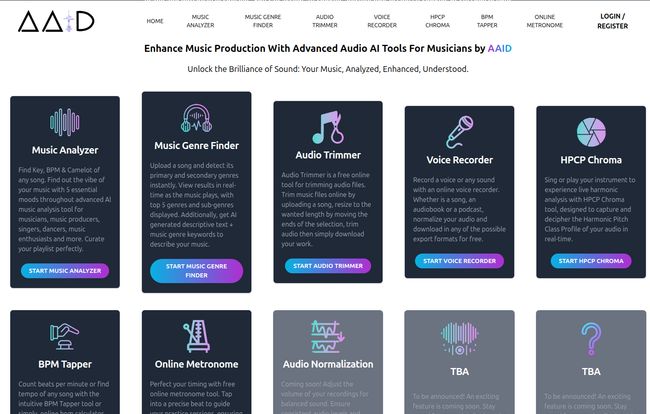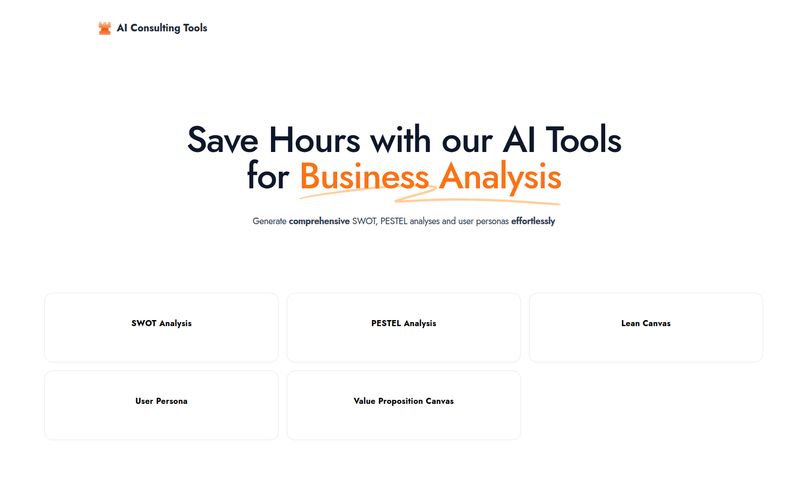I’ve been kicking around the digital media space for a long time. I’ve seen trends come and go, I've seen countless “game-changing” tools launch with a fizzle, and my BS-detector for anything labeled ‘free’ is, let’s just say, pretty well-calibrated. So when a platform like Audio AI Dynamics (AAID) pops up on my radar, offering a whole suite of AI-powered audio tools for absolutely nothing, my eyebrows go up. One goes up in skepticism, the other in genuine curiosity.
Is this another flash-in-the-pan with a hidden subscription model? Or is it actually a genuinely useful resource for the musicians, producers, and audio nerds out there? Well, I spent some time poking around, uploading tracks, and generally trying to break it. Let’s talk about what I found.
First Impressions: What Exactly is Audio AI Dynamics?
The best way I can describe AAID is a digital multi-tool for audio. You know, the kind of thing you'd keep in your pocket. It’s not the entire professional workshop—it's not going to replace your Pro Tools or Ableton Live setup—but it’s the gadget you'll find yourself reaching for to do a dozen different small, but important, jobs quickly and without any fuss. The entire platform is browser-based, which means no installations, no updates to manage, and no hogging your precious hard drive space.
The homepage is clean, presenting a grid of its tools right up front. There's no big, splashy marketing fluff you have to wade through. It just says, “Here’s what we do. Pick one.” I respect that. And the biggest draw? For most of the tools, you don’t even need to sign up. You just land on the page and get to work. In an age of endless logins and data harvesting, that feels... revolutionary.

Visit Audio AI Dynamics - AAID
It's clearly built for anyone who touches audio files: the bedroom producer looking to identify the key of a sample, the DJ prepping a set, the singer-songwriter needing a quick metronome, or even a podcaster needing to trim a clip. It’s a broad church, and AAID seems to have a pew for everyone.
Putting the AI Tools to the Test: A Feature Breakdown
Okay, let’s get into the meat and potatoes. A toolkit is only as good as the tools inside it. I ran a few different tracks through the system to see how it held up.
The Music Analyzer: More Than Just BPM
This is the flagship tool, and it’s impressive. You upload a track, and in a few seconds, it spits out the Key, BPM (beats per minute), and even the Camelot Key. For any DJs reading this, you know how massive that is for harmonic mixing. It saves a ton of time compared to doing it manually in software like rekordbox or Serato.
But the interesting part is the ‘Mood Detection.’ The AI analyzes the track and tags it with descriptors like ‘happy’, ‘sad’, ‘relaxed’, ‘aggressive’, or ‘danceable’. Now, is it perfect? No. Art is subjective. But for creating playlists or getting a quick vibe-check on a folder of new music, it’s surprisingly accurate. Its a handy little feature I didnt know I wanted.
The Music Genre Finder and HPCP Chroma
These two are for the real analysts. The Music Genre Finder does what it says on the tin. I fed it a classic 90s house track, and it correctly identified ‘House’ and ‘Electronic’ as the primary genres. It even offers AI-generated keywords, which could be gold for producers trying to describe their own sound.
The HPCP Chroma tool, on the other hand, is a bit more... esoteric. HPCP stands for Harmonic Pitch Class Profile. In simple terms, it creates a real-time visual fingerprint of the song’s harmony. For the average user, it might look like a pretty, colorful graph. But for a music theorist or a serious audio engineer, this is a powerful way to visualize the harmonic content of a piece. The fact that they include something this nerdy and specific on a free platform tells me the developers are serious about audio. They even credit their backend tech—Essentia.js from the Music Technology Group at UPF, Barcelona. That’s a sign of confidence and transparency you don't often see.
Practical Utilities: The Everyday Essentials
Beyond the fancy AI, you have the workhorses:
- Audio Trimmer: Simple, effective. Upload a file, drag the handles to select the part you want, and download it. Perfect for making samples, soundbites, or that custom ringtone you’ve been meaning to create.
- Voice Recorder: Again, dead simple. It uses your computer's microphone to record audio. It's not going to replace a Shure SM7B and an interface, but for capturing a quick vocal melody idea or a podcast intro on the fly? Absolutely.
- BPM Tapper & Metronome: Two classics. Every musician needs them. Sometimes you just hear a beat in your head or on the radio and need to know the tempo right now. The tapper is perfect for that. And the online metronome is a clean, no-frills tool for practice sessions.
The Good, The Bad, and The… Coming Soon?
No tool is perfect, especially not a free one. So let's be real about it.
The biggest pro is obvious: it’s genuinely free. The sheer amount of functionality you get without ever pulling out your wallet is honestly staggering. The convenience of having all these tools on a single, clean website without needing to sign up is a close second. It’s the definition of a low-friction experience.
On the flip side, there are a few things that gave me pause. The site lists an Audio Normalization tool as “Coming Soon.” This is a feature that adjusts the volume of your recordings for a balanced sound. To be honest, I was a bit surprised this wasn't already included in the Voice Recorder, but having a dedicated tool for it will be great... whenever it arrives. There are also two other “TBA” slots, which creates a bit of a mystery. I'm curious what they'll be, but for now, they're just empty promises.
And, of course, the whole platform is reliant on an internet connection. That’s the nature of web-based tools, but if your Wi-Fi is flaky or you’re working on the go without data, you’re out of luck.
Who is Audio AI Dynamics Really For?
I see this being incredibly useful for a few key groups:
- Bedroom Producers & Samplers: This is a godsend. Being able to quickly drag a downloaded sample into the analyzer to get its key and BPM before you even drop it into your DAW is a huge workflow enhancement.
- DJs: The BPM and Camelot Key finder alone make this site worth bookmarking. It’s a perfect tool for prepping tracks for a set, especially if your primary DJ software’s analysis gets it wrong (which happens!).
- Students & Educators: For music students, tools like the HPCP Chroma and metronome are fantastic, accessible learning aids. No need for expensive software licenses.
- Content Creators: Need to quickly trim an audio clip for a video or find some royalty-free music that fits a certain ‘mood’? This is your place.
So, What's the Catch on Pricing?
This is the question that kept nagging me. How is this free? I looked everywhere for a pricing page, a premium tier, an upgrade button. There isn't one. As of right now, Audio AI Dynamics appears to be completely free. My best guess is they might be operating on a model that will introduce premium, power-user features down the line, or perhaps they'll incorporate unobtrusive ads. For now, we get to enjoy the free ride, and I’m not going to complain about that.
Frequently Asked Questions about AAID
Do I need to create an account to use Audio AI Dynamics?
For most of the core tools like the Music Analyzer, Trimmer, and Metronome, no account is needed! You can just visit the site and start using them. A login/register option is available, which might unlock more features or save your history in the future.
Is AAID really 100% free to use?
Yes, as of my review, all the available tools on the platform are completely free. There are no hidden charges or subscription fees mentioned anywhere on the site.
What kind of audio files can I upload?
The platform seems to work best with standard audio formats like MP3, WAV, FLAC, and OGG. I tested it with MP3s and WAVs, and it handled them without any issues.
Is my audio data safe when I upload it?
This is a valid concern with any online tool. The platform's privacy policy would have the official details, but generally, for analysis tools, the audio is processed on their servers and not stored long-term. Since no registration is required for most tools, you're not tying your personal data to the audio you upload.
What is HPCP Chroma again, in simple terms?
Think of it as a musical DNA test. It shows you the strength of each of the 12 musical notes (C, C#, D, etc.) in a piece of music over time. It helps you see the harmony and chord progressions.
The Final Verdict
I came in skeptical, but I’m walking away impressed. Audio AI Dynamics isn't trying to be the one and only audio program you'll ever need. It knows its lane. It’s a fast, efficient, and surprisingly powerful collection of tools that solves a ton of the little, annoying problems that musicians and producers face every day. The fact that it’s free and requires no login is the killer feature that elevates it from just 'another tool' to something I will genuinely bookmark and use.
It’s a fantastic supplement to a professional workflow and an even better starting point for those new to audio production. Give it a whirl. What have you got to lose?



